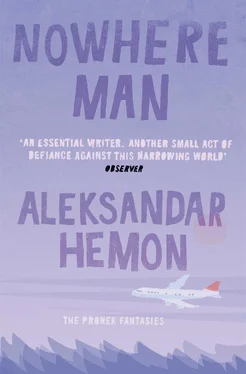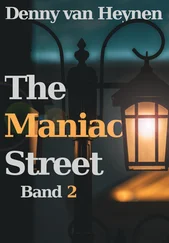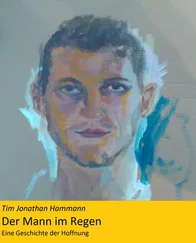“Why me?”
“All right, step back.”
She pushed the mouse onto the bin with the broom and it rolled over, but then it shook its head and flexed its legs, as if waking up from a long sleep.
“Jesus, it’s alive,” she grunted.
“Fuck,” Pronek said, and realized that if someone were listening he’d think Pronek was saying it like a real American. “Motherfucker,” he said.
“Get a bucket and fill it up with water,” Rachel said.
Pronek found a tin bucket in the bathroom, emptied it of rags and sponges, and filled it up halfway with water — he watched the deluge coming out of the faucet and imagined himself at the bottom of the bucket, the water coming down crashing on him.
Rachel was pressing the mouse down on the pan with the broom. She dropped it into the bucket. For a moment the mouse floated on its back, a grin of horror on its little pointy face, but then it turned over and started swimming. The water was clear, they could see the bottom. The mouse was scratching the walls with its claws, trying to climb up, but it was clearly hopeless.
“Drown it,” Rachel said.
“I can’t.”
“Drown it!” She pressed the mouse’s head with her index finger, the mouse sank but then resurfaced. She pressed it again, but then recoiled when it tried to grab her finger. The mouse flapped around with its tiny paws, its tail snaking behind. When it reached the bucket wall, it scratched it frantically.
“Maybe we can leave it there,” Pronek said.
“I don’t think so. I don’t want to listen to its death throes all night long.”
“Maybe we can throw it outside.”
“No, it has to die.”
“I have never seen the mouse like this.”
“A mouse like this.”
“What?”
“A mouse like this. Not the mouse like this.”
“Why you have to correct me all the time?” He stood up and turned away in anger from Rachel and the bucket.
“Why do you have to correct me all the time?”
“What’s difference? You understand me.”
“What’s the difference.”
“Stop it!” he yelled.
“Don’t you yell at me!” Rachel screamed back.
The mouse was swimming in circles. Pronek felt rage leavening in his stomach, something pushing the inside of his temples, the heat swarming in his eyeballs. He stood facing Rachel, who looked at him with belligerent disgust. It became clear to him at that moment that he didn’t want to be there — the thought spread out before him like a ski slope — and there was nowhere he wanted to be. He heard the mouse scraping the bucket, the horrible din. And then, with a motion of his foot that seemed incredibly slow to him, but startled Rachel, he kicked the bucket and it flew toward the wall, the water splashing and sloshing around, stray droplets sparkling. He felt the release inside — the fury deluge broke the dam in his stomach and flooded his body as the bucket smashed into the wall.
“What the fuck are you doing?” Rachel grabbed her hair and pulled it.
“Correct this!” he screamed, and flung The Idiot across the room. He grabbed the marble bowl and emptied it on the floor — the marbles cackling hysterically and rolling away in myriad directions. He smashed a flowerless vase against the wall. He swept the picture frames off the TV and they crashed on the floor, the shards scattering around. He kicked the pumpkin-shaped clock like a soccer ball and it landed on the sofa. He walked over the shards toward the Kiss-Me-I’m-Irish mug and pitched it at the floor. He flung the tin frog toward the kitchen, stomping over the shards, cutting his soles. In the kitchen, he ripped the map of the world off the floor and stamped on it, leaving bloody smudges.
“What are you doing? I’ll call the police!”
He grabbed a pomegranate and smashed it against the wall, the pomegranate exploding like a head, the crimson brains everywhere.
“Call the goddamn police. Let them throw me out of this fucking country!”
He snatched Rachel’s photos off the wall and smashed them. He pulled books off the shelves, tore them apart, and launched the pages toward the ceiling. And all along there was a tranquil nook inside him, from which someone else was calmly observing him wreaking havoc.
“What got into you?” Rachel cried. “I love you! What did I do to you?”
He pulled the phone cord and the receiver split from the phone and fell on top of the book pile. He pushed the TV off the stall and it came down with a thud. Rachel ran toward the bedroom, and Pronek followed her, ready to do the bedroom too. He punched the bedroom door, bloodying his knuckles.
She emerged from the room with the camera. She started pressing the camera button frantically, saying: “What did I do to you?” and Pronek saw the aperture blinking.
“You want to take a picture of me? You want to take a picture of me?”
He started ripping his pajamas apart, the buttons flying like ricocheted bullets. He ripped off his undershirt, then his underwear, and stood naked, the sweat glistening on his skin. He tottered toward the camera, with his hands extended toward it.
“You want to see me? You want to see the real me?”
He banged his chest with his fists, as if trying to break it open.
“Here! Here!” he screamed, until he lost his voice.
And here we are: he is down on his knees, bleeding; he is surrounded by the debris. Dizzy with the violent adrenaline, he closes his eyes, and waits for Rachel to stop taking pictures and touch his cheek, redeeming him. A hand touches his face, tenderly, delicately, sliding its tips across the hollow of his cheek. He gasps and slowly, one sob at a time, he starts to cry.
But he doesn’t know that the hand stroking his cheek is mine. He cannot hear me saying to him: “ Ne pla  i. Sve
i. Sve  e biti u redu. ” Calm down, I’m telling him, everything will fall into place. Let us just sort through this destruction. Let us just remember how we got here. Let us just remember.
e biti u redu. ” Calm down, I’m telling him, everything will fall into place. Let us just sort through this destruction. Let us just remember how we got here. Let us just remember.

KIEV, SEPTEMBER 1900-
SHANGHAI, AUGUST 2000
On the horizon you could see black, bloated, heinous clouds leading a storm charge. And the sea kept licking the rusty ship — the Pamyat —loaded with destitute men, officers and soldiers alike, left with nothing but their honor, still wearing impeccable uniforms, exuding a faint scent of the Trans-Siberian railway. The officers’ wives, the finest ladies all, choked with swallowed tears, waving at their loyal servants on the shore, lined up like a choir in a great tragedy, hating the Bolsheviks even more than their mistresses. There was a young captain going around, politely imploring the ladies to get rid of excess baggage, and they obeyed — what difference did it make now? You could see millions of rubles in fur, bobbing in filthy water, like rat corpses. Amid the sinking fur and suitcases, there was a little lap dog barking shrilly, paddling feebly with its tiny paws, slowly losing its strength, until it drowned. Our hearts sank with it.
And the Pamyat sailed off, and no one on it could take their eyes off the beautiful shoreline, the lush forests and the curved mountains under the clouds: our Russian land, our mother’s breasts. We all wept, women and men, waves slamming the ship, as if they were waves of tears. And I stood at the prow, the Pacific wind ripping the skin off my face [he touches his scar], Vladivostok devoured by the mist behind me. You must believe me, I was deliberating whether to shoot myself, to empty my head and my heart, the devil take it all, for what is life, little sister, what is life without Russia. But then I heard my men singing with deep sonorous voices, coming straight from their Russian hearts, singing as no men had sung before: “Do not close your eyes, Mother Russia, for it is not time to sleep.” And it gave me strength. I did not kill myself, and here I am in Shanghai now, alive and swimming, although there are days, and this is one of them, when I regret that I did not blow my brains out, on the Pamyat , with my final gaze locked on Russia.
Читать дальше

 i. Sve
i. Sve  e biti u redu. ” Calm down, I’m telling him, everything will fall into place. Let us just sort through this destruction. Let us just remember how we got here. Let us just remember.
e biti u redu. ” Calm down, I’m telling him, everything will fall into place. Let us just sort through this destruction. Let us just remember how we got here. Let us just remember.











